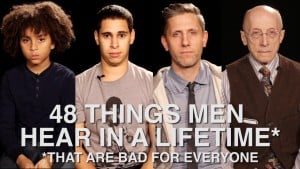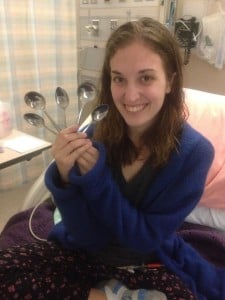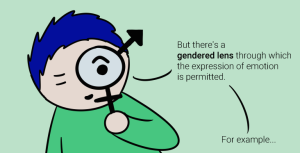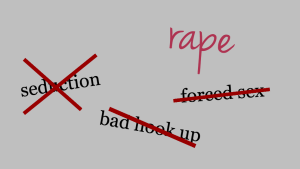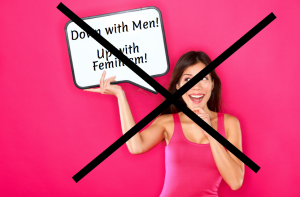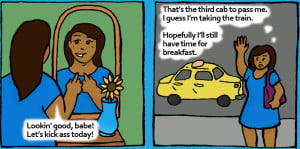(Content warning: intimate partner violence, assault, self-blame)
“Felicity lifts the doll and smoothes the dirt from its face. ‘I had a doll like this once. And they said she was wicked, too. But she wasn’t. She was a good and true doll. And so is yours, Polly.’ The little girl’s lips tremble. ‘But she lies.’ ‘The world is a lie,’ Felicity whispers. ‘Not you and me.’” —Libba Bray, The Sweet Far Thing
I never went to therapy after getting out of my relationship with an abusive partner because secretly, I didn’t believe that I had been abused.
Even after years had passed, even after I wrote several articles and dozens of poems about it, even while I was studying the invisible mechanisms of abuse and trauma as a student therapist, there was a fragment of the person who hurt me (I still can’t say “my abuser”) buried inside my consciousness.
And from that hidden place, a voice whispered constantly that I was a liar, that I just wanted attention (as if wanting attention was something shameful), that people like me can’t be abused because we deserve to be hurt. That I was a broken person, rotten from the inside. That I didn’t deserve the kind of loving relationship that isn’t violent.
It wasn’t until I actually started practicing therapy and working with other survivors that I realized that I wasn’t, in fact, an exception to the rule: Anyone can experience abuse. It’s the work of abuse to render itself invisible, to convince even the survivor that it’s not really happening.
Even when survivors do speak up, abuse tries to persuade us that we’re “doing it wrong.” That we should have been braver, more forgiving, more lovable as we tried to protect ourselves.
As I started to address these internalized, abusive ideas with my clients, I also had to address them in myself. And as we continued to work together, my clients and I began to uncover, again and again, certain powerful and healing truths.
Here they are, written down, for all you survivors out there.
I hope they mean as much to you as they do to me.
1. It’s Not Your Fault
Many survivors are told this, but aren’t able to really believe it.
If this is the case with you, try this: Say it to yourself, over and over again. Look at yourself in the mirror, right in the eyes. Say, “You are not to blame for the violence that someone else has done to you. It was not your fault then, and it is not your fault now.”
It doesn’t matter what you wore, who you talked to, what you thought or said or felt.It doesn’t matter how many times the perpetrator of abuse “warned” you or how many rules they said you broke. It is not your fault.
It. Is not. Your fault.
2. You Can’t ‘Deserve’ Abuse
One of the most insidious effects of abuse is that it makes us think not only that we have somehow caused the abuse to happen, but also that we have done so because we are fundamentally bad.
Psychologists call this effect “cognitive dissonance.”
Simply put, it’s often easier to believe that we deserve to be hurt than that someone we care about might be doing violence to us without a good reason.
Since the abuse usually doesn’t stop no matter how we try to change our behavior, we start to think that it’s not our actions, but our personalities and our thoughts that are making it continue.
The doctor and trauma researcher Judith Herman writes that it’s not enough for most perpetrators of abuse to terrify and dominate their victims – we must also begin to think the way perpetrators do, and admit that the abuse is justified.
But it’s impossible to deserve abuse, because there is no such thing as a justification for abuse. And neither you nor I deserved what happened to us.
3. You Aren’t ‘Broken’ Beyond Repair
How many times have survivors told me that they feel like “broken” people? How many times have I said it about myself?
In the aftermath of abusive trauma, it’s easy to feel as though something essential has been ripped away from us that we can never get back. Victimizing stereotypes and media portrayals of survivors as hysterical, weak, and psychologically scarred reinforce this feeling.
Survivors are too often defined by the abuse they have lived through, instead of as real, dynamic people.
I used to tell the survivors that I supported that abuse can hurt you, but not break you. This is what I had been taught to say. Then I realized how falsely that resonated within my own understanding of abuse.
The truth is, the experience of abuse can take away certain parts of us, for a time: our capacity to feel romantic and/or sexual, our understanding of ourselves as good and joyful people, our ability to create intimacy and trust with others, to name a few.
Here’s what I really believe: If you feel that abuse has broken you, then you may indeed be broken. I was broken for a long time. But it is impossible to break the human spirit beyond repair.
You and me? We’re survivors. Given enough time, we can heal from anything.
4. You’re Allowed to Feel Whatever You Feel
Abuse is often an enormous, life-consuming experience that colors your perception of yourself, the world, and everything in it.
So you get to feel whatever it is you feel: rage, sadness, despair, vengefulness, hope, or nothing at all. Your emotions belong to you, and you choose how you want to express them.
And no, you’re not “whining” too much. You don’t have to stop “feeling sorry for yourself.” You don’t have to “get over” anything faster than you want to. And if you want attention, well, you deserve attention.
Owning our emotions is the beginning of getting free.
5. Only You Get to Decide If and When You Want to Forgive Your Abuser
There tend to be two extremes when other people talk about perpetrators of abuse.
On the one hand, there are folks who make excuses for them; and on the other, those who caricature them as the spawn of Satan.
People are always telling us that we need to forgive faster or hate harder than we are ready to. They want us to shut the people who hurt us out of our lives, call the police, seek “justice.” Or they want us to turn the other cheek, be the bigger person, “open our hearts.”
Here’s another idea: You get to decide if and when you’re ready to forgive.
And if you want to forgive today and then get justice tomorrow, or vice versa, or neither, that is up to you.
6. It’s Okay to Love Your Abuser
Here’s a secret: I will always love the person who hurt me the most. I will never stop loving him, and I’ve stopped trying.
Love and abuse share a complicated and terrible intersection.
All I can say to you is that love never justifies abuse, and abuse doesn’t negate the possibility of love. If you still care about the person or people who abused, that doesn’t make you weak, or the abuse less real.
7. You Can Trust Your Feelings (Even If Your Memories Change)
It’s possible that your memories of the abuse you have lived through are slippery, that you can’t always remember exactly what the perpetrator did that was abusive. The story may change as you are telling it, despite your best efforts to hold on to something solid in the telling.
This is what happens to me, and when it does, I start to hate myself. I tell myself that I am crazy, a liar.
But the way that gaslighting and trauma work is by warping your perception of reality. It is, in fact, very common for survivors of any kind of trauma to be unable to remember what happened in the same way, every time.
Unlike linear memory, however, emotional memory usually only clarifies itself with time.
That is to say: You may not remember each exact incident of abuse, but you will remember the feeling of experiencing violence. You will remember the terror, the feelings of helplessness and suppressed rage.
These feelings, more than courtroom-style “facts,” are the basis of your truth.
8. You Are Brave
I’d like to clarify something:
Leaving a relationship with an abusive partner takes courage – and isn’t “running away.”
Staying in a relationship with an abusive partner takes courage – and isn’t “not standing up for yourself.”
Going back to a relationship with an abusive partner takes courage – and isn’t “giving in.”
We always have complex reasons for the decisions we make about abuse in our lives, but they often have more to do with what seems possible than with what’s brave.
You have always been brave, even when you haven’t felt like it. No one should ever tell you otherwise.
9. You Deserve Better
I remember clinging on, desperately, to abusive partners because I believed that they were the best I was ever going to get. The people who were being abusive to me exacerbated this by telling me what a huge sacrifice they were making to love me, how I was lucky to have them because no one else would.
I will tell you right now: If the love you’re receiving doesn’t feel good in the long term, then you deserve something better.
All relationships go through conflict, and no relationship is always easy, it’s true. But the feeling of being loved well does not include being made to feel afraid or ashamed.
And everyone – everyone! – deserves to be loved well.
10. You Are Lovable (Yes, Even Your ‘Real Self’)
As a survivor, I learned quickly to keep secrets: about things Ithought and wanted, about what I did or didn’t do to survive. Unspoken, these secrets become a part of me, the way I saw and understood myself.
After the abuse was over, I still held on to my secrets, because they contained the awful truth about who I was. They were the last, unbreakable link to the world of abuse that I once lived in.
And if anyone knew my secrets, knew who I really was, then they wouldn’t love me anymore.
It took meeting other survivors, hearing their stories, for me to release my secrets. For me to understand that I was loveable – every part of me, even the parts I hated, the parts that I thought the abuse had ruined.
I am lovable. You are, too.
11. Things Can Change
Dear survivors, if you don’t believe anything else I’ve written in this article, then I hope that you believe this: Things can change.
Abuse teaches us that we are trapped forever, frozen in time. We feel as though we will always be the person that the perpetrator of abuse tried to make us into, that we will always be in relationships with abusive partners. As though we can never get out, never change, never find anything better.
Even after we’re out of the relationship, the traumatic memories of abuse remain with us, bringing us back, again and again, to that time.
But if there is anything I have learned from my entire history of being in a relationship with an abusive partner, it’s this:
The abuse can end. You can heal. Things can change.
[do_widget id=’text-101′]
Kai Cheng Thom is a Contributing Writer for Everyday Feminism. She is a Chinese trans woman writer, poet, and performance artist based in Montreal. She also holds a Master’s degree in clinical social work, and is working toward creating accessible, politically conscious mental health care for marginalized youth in her community. You can find out more about her work on her website and at Monster Academy.
Search our 3000+ articles!
Read our articles about:
Our online racial justice training
Used by hundreds of universities, non-profits, and businesses.
Click to learn more







